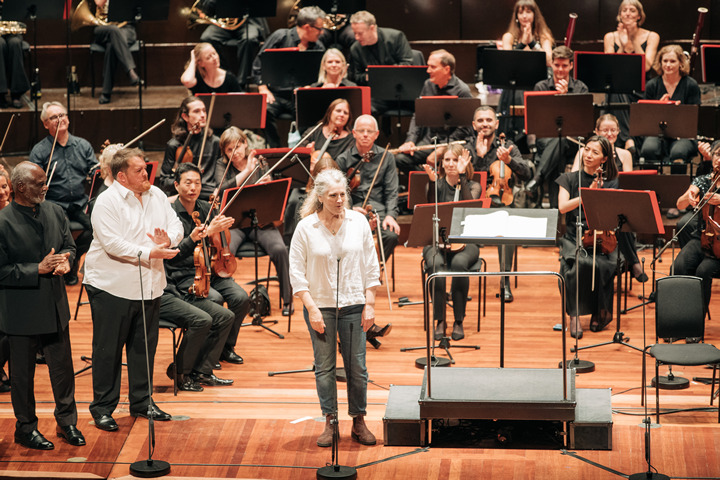| Opera Reviews | 27 April 2024 |
A Fidelio that combines humour and darknessby Catriona Graham |
|
Beethoven: Fidelio |
|
 |
|
|
Operas which are not through-composed, and which have chunks of of spoken dialogue, pose a problem for concert performances. What do you do about all the words? Beethoven’s Fidelio is a case in point, and one solution is Sir David Pountney’s adaptation, framing it as a Truth and Reconciliation Commission report by Don Fernando. This is the approach taken by the Philharmonia Orchestra, in their Edinburgh Festival performance. It allows a degree of staging, without the need for props. It also allows the audience to concentrate on the music. With Sir Willard White as Don Fernando / Narrator and Sir Donald Runnicles wielding the baton, there are stars on the stage already. The opening duet, however, between an importuning Jaquino and an exasperated Marzelline set a high standard – Gideon Poppe wheedling, ingratiating, and Kim-Lillian Strebel torn between good manners and self-preservation. Strebel was a vivacious Marzelline, though one wondered whether she really was ‘in love’ with Fidelio, or just with the idea of someone other than Jaquino. Emma Bell, taking over Leonore at relatively short notice, turned in a classy performance right away. She eschewed a frock for the verisimilitude of jeans, ankle boots and an overshirt. We felt her disconcertion when she realises Marzelline has fixed on her as a ‘husband’, and her distress in the dungeon, when she is meant to be helping dig her husband’s grave. "Mir ist so wunderbar" is the first test of the balance of voices, with Günther Groissböck joining in as Rocco. The balance shone through the rest of the quartets and trios. In "Hat man nicht auch Gold beineben," his practical man clearly won over any romantic notions. Don Pizarro is the baddie of the opera, and Markus Brück played it as Mr Angry, albeit with a vein of spite. Clay Hilley’s Florestan was a powerful performance, his vision of angelic release from the prison tender. The duet with Leonore, when they are re-united in freedom, was touching without being saccharine. As prisoners breathing fresh air for the first time in ages, the trepidation with which they ventured out into the fresh air was palpable. In that, and in the rousing chorus which greets Don Fernando, the Philharmonia Chorus produced a bright sound, with a tremendous dynamic range. Sir Willard himself, having narrated to that point, was authoritative in pronouncing judgment and bringing all to a good end – except for Don Pizarro. The final hymn-like chorus "Wer ein holdes Weib errungen" really did sound like a hymn of thanksgiving. The Philharmonia Orchestra itself, fresh from three nights of Rusalka, provided a lively account of Beethoven’s score. Sir Donald Runnicles brought out a jauntiness in much of the music, juxtaposed with some real menace from the tympani. This was an enjoyable performance which brought out both the humour and the darkness of score and libretto. |
|
Photo © Andew Perry |
|







